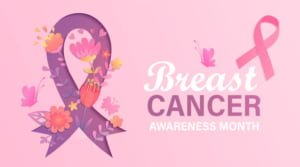
October is National Breast Cancer Awareness Month. While we should be keeping breast cancer in mind all year long, October has been devoted to educating everybody about breast cancer. No matter who you are or where you are, breast cancer has the potential to touch your life. Whether it touches you directly, a family member or friend, or a lived one, it is important to understand the warning signs of breast cancer.
Tips for You!
- Know your risk. Breast cancer can impact people of all genders. Knowing your family history can be lifesaving. If others in your family have battled breast cancer, you may be at higher risk. Discussing your family history with your doctor can help to create a personalized plan to monitor the signs and symptoms of breast cancer.
- Get screened! Mammograms save lives. Early detection and treatment can be pertinent to the fight against breast cancer.
- Learn your normal. Learn what looks and feels normal for yourself by doing monthly self-checks. Knowing your normal can help you better recognize when something does not look or feel right.
- Don’t just check in October! While October is devoted to breast cancer awareness, it is important to be aware of the signs and symptoms all year long. Monthly self-check are essential to catching anything abnormal as early as possible!
- Eat healthy and be physically active. Living a healthy lifestyle can help to lower your risk.
Tips to Help Others!
- Use inclusive language. Breast cancer can impact anybody, not only cisgender women. Non-binary individuals, transgender individuals, and cisgender men can be diagnosed with breast cancer. Being gender inclusive when discussing breast cancer can help save lives!
- A cancer diagnosis can lead to a multitude of different emotions. Sometimes the best thing you can do for somebody that has been diagnosed with cancer is to listen to them, empathize with them, and let them know they are not alone.
- Don’t compare! Everybody’s experience with breast cancer is different. People deal with diagnosis and treatment in many ways. Try to avoid giving comparative advice. Keep in mind everybody’s experience is unique!
- Offer practical support. Side effects from treatment can make everyday tasks difficult. Some things you can offer to help with are cleaning, laundry, cooking, babysitting, or transportation to and from appointments!
- Support for you! Supporting a friend, family member, or colleague that has been diagnosed with breast cancer can be stressful. To continue to support your loved one, you need to make sure you look after yourself as well! Work to eat well, get some exercise, and get a good night’s rest. If you are having trouble or are feeling overwhelmed, reach out to us at Capital EAP for additional support!
By, Julia Cornman, EAP Counseling Intern
